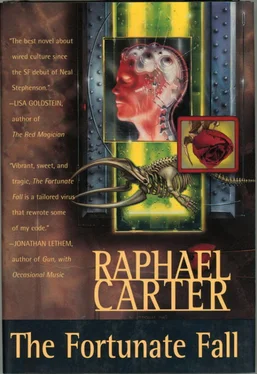Raphael Carter - The Fortunate Fall
Здесь есть возможность читать онлайн «Raphael Carter - The Fortunate Fall» весь текст электронной книги совершенно бесплатно (целиком полную версию без сокращений). В некоторых случаях можно слушать аудио, скачать через торрент в формате fb2 и присутствует краткое содержание. Город: New York, Год выпуска: 1996, ISBN: 1996, Издательство: Tor Books, Жанр: Киберпанк, на английском языке. Описание произведения, (предисловие) а так же отзывы посетителей доступны на портале библиотеки ЛибКат.
- Название:The Fortunate Fall
- Автор:
- Издательство:Tor Books
- Жанр:
- Год:1996
- Город:New York
- ISBN:0-312-86034-X
- Рейтинг книги:3 / 5. Голосов: 1
-
Избранное:Добавить в избранное
- Отзывы:
-
Ваша оценка:
- 60
- 1
- 2
- 3
- 4
- 5
The Fortunate Fall: краткое содержание, описание и аннотация
Предлагаем к чтению аннотацию, описание, краткое содержание или предисловие (зависит от того, что написал сам автор книги «The Fortunate Fall»). Если вы не нашли необходимую информацию о книге — напишите в комментариях, мы постараемся отыскать её.
“Gripping…. One of the most promising SF debuts in recent years”.
—“Publisher’s Weekly” starred review
The Fortunate Fall — читать онлайн бесплатно полную книгу (весь текст) целиком
Ниже представлен текст книги, разбитый по страницам. Система сохранения места последней прочитанной страницы, позволяет с удобством читать онлайн бесплатно книгу «The Fortunate Fall», без необходимости каждый раз заново искать на чём Вы остановились. Поставьте закладку, и сможете в любой момент перейти на страницу, на которой закончили чтение.
Интервал:
Закладка:
“Then you see yourself as no better than a Guardian?”
“We are separated only by this: the Guardians expected that their evil would go on forever. The Army hackers thought they could commit their crime and then erase it from the minds of men forever. But that does not work. There is only one way to contain an evil you have once begun, and that is to provide a scapegoat. You may find someone else to fill the role—that is the coward’s way. But the wise man, when forced into evil, makes a scapegoat of himself. That is what Judas does. He knows what must be done; he does it; and then he makes sure that the people he has benefited will revile him, because only that can prevent his crime from being repeated. He takes the damnation that he has deserved, even though he has done more for the faith than Christ himself. He does not just accept damnation, he rushes to it; the touch of the rope is a lover’s embrace—”
“Then you believe in literal damnation? In flames and devils and all that?”
He opened his mouth to speak, then stopped and looked down at his hands. “I don’t know,” he whispered. “I used to think… No,” he said in a firmer voice. “I don’t. For the whale and I are now one soul—that is the central fact of my existence. How can you splice two incorporeal souls together? And if anyone could do such a thing, would it be Derzhavin? No, the soul is the brain—I am the proof of that. And if the soul is flesh, it rots like flesh. I still hope, but I do not believe. So, since death is the end it appears to be, I have taken measures of my own.” He raised his head and looked me in the eye. “But perhaps by now you have begun to guess the first betrayal, from which the others all derive.”
It was the last thing on my mind. “Why don’t you tell me,” I said.
“Why, Maya Tatyanichna, when you spoke to the whale, didn’t she ask you the time, as she asks everything in grayspace that will talk to her? And didn’t it strike you as an odd question, coming from a whale? Unless hours were schools of fish, and minutes krill—”
“She told me why,” I said.
“Well then.”
“Your betrayal is in letting her die?”
“No. Just the reverse.”
“But—”
“When we were escaping the camp, and I wouldn’t let her go out of radio range, it was not for my sake, you know. Piled up there, a corpse among corpses, I hardly expected to outlive the day. If I could have sent her away I would surely have done so, at the cost of my own life. But every time our contact weakened, she would sink in the water and try to empty her lungs. She knew it was no ocean for a whale, not anymore, and that there were no others of her kind for her to seek out. She wanted to die—even then, while we were still ecstatic with our newfound freedom. How much more she wants it now that she is back in this cage, you may readily imagine. No, this Judas’ betrayal is not in allowing her to die. It is in having made her live.”
I looked back at the tank. “She’s your idea of Christ?”
“Why, Maya Tatyanichna, Christ is everywhere for the killing. Every Postcop is a Roman soldier, offering tea instead of vinegar; and when Luther tacked up his laundry list, he had to drive the nail through blood and bone.”
“And Hell?” I asked.
“Myself am Hell, nor am I out of it. Take away the whale, and I am what I was when Derzhavin found me. A mind falling through darkness—without memory, without language—”
He broke off, and looked at me. In his eyes, for the first time, there was a hint of vulnerability, as though he wanted my approval.
“I don’t think,” I said with careful malice, “that any truly good motive should require a degree in theology to Understand.”
He burst into laughter. “No doubt you’re right,” he said. “All the years that I looked forward to this moment, I supposed I’d feel some sort of triumph—some fulfillment. But now that the time has come, I feel like Dr. Doom haranguing the Fantastic Four.” He shrugged. “It doesn’t matter. My duty does not change, just because I have begun to feel ridiculous.”
For a moment I stopped thinking of escape, and looked at him. Here was a man who had followed logic all the way around to where it swallowed its tail, and even when it vanished down its own throat, had gone after it into the void. The wires he wore had grown all through him, as the roots of trees replace the flesh of corpses; and the vast coils of the whale’s brain wrapped around him like a gray constricting snake. I pitied him: but it was probably stray feedback from the Net, and I regretted it afterward, and it was only for a moment.
“No,” he said to himself, almost wistfully. “It doesn’t change what I must do.”
And then the sensation drained out of my face. I heard myself pronounce the words: “O vos omnes, qui transitis per viam, attendite et videte si est dolor similis sicut dolor metis. ” The Net echoed: “All you people who pass on the street, look, and see if any pain is like my pain….”
Eighteen
YOU MUST REMEMBER THIS
I loved her name. I couldn’t help it. I would release a worm to write her name in every angular gyrus from here to Thailand. I would convert her name to salts, to textures, to the image of a fern in biosonar. I had never heard a name so beautiful, though it was not a name that suited her—it was far too soft a name for her precise young features—and though I thought it much the lovelier when sharpened by my Leningrader accent. I tried to prevent her from saying her own name, hastily introducing her to strangers.)
“SUPPRESSION NINETY-FIVE PERCENT,” said Horus. He opened his hands on the African mogo, locked in an endless loop of fragmentation and reanimation, flowering and decay.
“Why are you doing this?” I cried out.
“I am giving the rest of the world their souls back, Maya Tatyanichna,” the old man said. “It would be petty of me to withhold that same violence from you.”
“NINETY PERCENT,” the god intoned.
(I couldn’t remember the place where we met, except that it was all one color, all one scent, and had a rhythm to it. It might have been by the ocean in winter, where the gray-green water merges with the slate gray pebbles and the gray-blue sky. It might have been by ripened grain in summer, when each field is like a body, ocher-gold from head to foot and all one breathing. It might have been beneath the waves of storm in grayspace, which at that time was still an unsuspected country that even Weavers barely knew. But no—it was not there, because I had seen her face. That much I remembered, though I could not remember what she said to me, or what she wore, or whether we walked or sat or stood. None of that mattered. We had barely brushed against each other, yet I came away dusted with desire, like a bee with pollen. Her face, her name—no more: that alone had drawn me to her. Her name, her face: and even now I could remember what they meant to me, though I could not seem to remember what her name was, and though some trick of memory, like half-silvered glass, combined her face with that of Keishi Mirabara.)
“Emergency override,” I said. “Restore suppression.”
“Desuppression is nonterminable,” the god informed me mournfully. “EIGHTY PERCENT.”
(She was translating Pushkin’s poems into KRIOL. I caught a glimpse over her shoulder:
I loved you thus-so ((truly, tenderly),
may God grant you be loved by another)
“The logical structure is knottier than it looks,” she said. “KRIOL doesn’t handle this sort of thing very well—unless you reverse the comparison, of course, but then you lose the poetry—”
I didn’t understand a word she said. I loved her.
Читать дальшеИнтервал:
Закладка:
Похожие книги на «The Fortunate Fall»
Представляем Вашему вниманию похожие книги на «The Fortunate Fall» списком для выбора. Мы отобрали схожую по названию и смыслу литературу в надежде предоставить читателям больше вариантов отыскать новые, интересные, ещё непрочитанные произведения.
Обсуждение, отзывы о книге «The Fortunate Fall» и просто собственные мнения читателей. Оставьте ваши комментарии, напишите, что Вы думаете о произведении, его смысле или главных героях. Укажите что конкретно понравилось, а что нет, и почему Вы так считаете.












